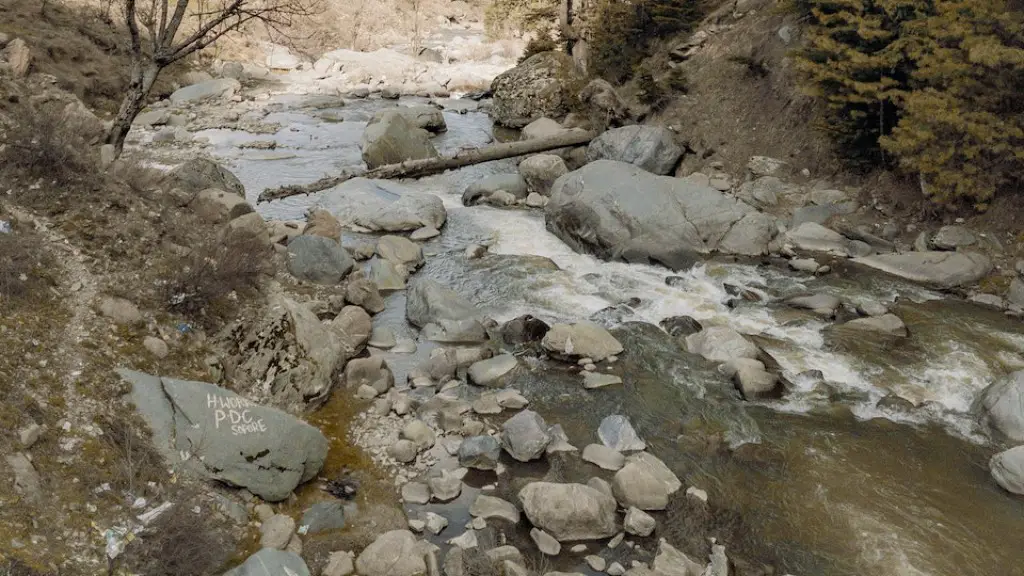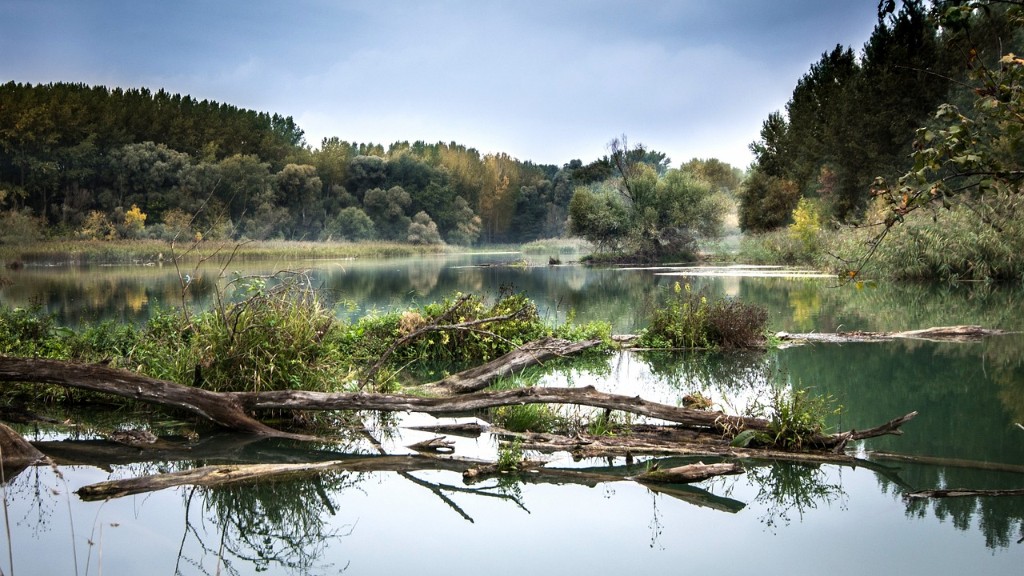Recently, a lot of people have been asking “Is it safe to eat fish from the Mississippi River?” Fish consumption has long been a popular activity in the U.S., so this is an important question to address. The answer can depend on the location and specific area of the river, as well as the state regulations.
The Mississippi River is the fourth longest river in the world and forms the boundary between several states. Because of its size, it frequently carries contaminants from both upstream and downstream sources. In addition, many states have industrial cities and agricultural runoff along the banks of the Mississippi River which could potentially increase the rate of water pollution.
Recent studies have indicated that there is a high concentration of mercury, arsenic, and other heavy metals in the Mississippi River. These contaminants can accumulate in fish over time and enter the human body through the consumption of contaminated fish. The good news is that all states along the Mississippi River are making efforts to reduce mercury and other polluting agents.
The U.S. Environmental Protection Agency (EPA) has set limits on the amount of mercury that can be in fish. States along the Mississippi River are required to test the water quality and meet the state standard for mercury and other pollutants. If the mercury and other pollutants levels remain at safe levels, then it is generally safe to eat fish from the Mississippi River.
It is important to note, however, that fish consumption is not entirely risk-free. Fish consumption advisories for the states along the Mississippi River can provide additional information about the state standards and levels of pollution found in the river. Most fish consumption advisories are issued by the state department of health when it is determined that the levels of contaminants exceed acceptable standards.
People who are pregnant or nursing should also be especially cautious when consuming fish from the Mississippi River. Fish can accumulate more contaminants over time, so it is important to limit the amount of time that a person is exposed. Furthermore, it is a good idea to buy fish from trusted sources or those that are sustainably sourced.
In summary, while it is safe to eat fish from the Mississippi River, extra caution should be taken to ensure that it has been tested and is within state standards. It is also important to pay attention to local fish advisories and limit the amount of time that a person is exposed. With the right precautions in place, people can enjoy the many benefits of consuming fish while remaining safe.
Industrial Pollution
The Mississippi River is dotted with many industrial cities, including Memphis, Tennessee; Vicksburg, Mississippi; and St. Louis, Missouri. These cities are responsible for much of the pollution in the Mississippi River. In Memphis alone, 70% of all wastewater is industrial wastewater.
Industrial wastewater contains a variety of chemicals and heavy metals, such as mercury, lead, and cadmium. The water from industrial sites often contains more than 100 times the maximum contaminant levels accepted by the EPA. This can be very dangerous for both wildlife and humans if left unchecked.
States along the Mississippi River are required to test the water and implement cleanup plans to ensure that industrial pollution is kept at acceptable levels. In addition, river clean-up initiatives by non-profit organizations such as The Mississippi River Trust are helping to reduce industrial pollution in the river.
The Mississippi River Trust works with cities, corporations, and other partners to reduce industrial pollution. The Trust has implemented a number of initiatives, including water monitoring programs and the establishment of cleaning and education programs. Through these initiatives, The Trust is making a positive impact on the health of the Mississippi River.
While the Mississippi River continues to be polluted with industrial runoff, it is still possible to enjoy it in a responsible and safe way. It is important to pay attention to local advisories and purchase sustainable fish to reduce the risk of consuming contaminated fish.
Agricultural Pollution
Agriculture is another major source of pollution in the Mississippi River. Agricultural runoff is responsible for the majority of sediment, nitrogen, and phosphorus pollution in the river. These contaminants can be particularly harmful to aquatic creatures, wildlife, and humans.
States along the Mississippi River have implemented a variety of initiatives to reduce agricultural runoff. For example, the Mississippi River Basin Initiative works with farmers to implement conservation measures such as cover crops, crop rotation, and irrigation systems. These methods help reduce sediment, nitrogen, and phosphorus runoff into the river.
In addition, states along the Mississippi River have implemented buffer strips, which create a barrier between the water and the land. These buffer strips help filter contaminants from entering the water before they have a chance to pollute it. This can help reduce the amount of pollutants in the Mississippi River.
While agricultural runoff is still a problem, initiatives like the Mississippi River Basin Initiative are helping to reduce runoff and protect the health of the river. It is also important to support local farmers and purchase sustainably-sourced products to help reduce agricultural pollution.
Future Initiatives
In addition to current initiatives, there are a number of future initiatives that could help reduce pollution in the Mississippi River. One example is the use of vegetative buffer strips, which can help reduce runoff and reduce sediment, nitrogen, and phosphorus pollution. Another initiative is the use of stormwater best management practices, which can help capture and filter out pollutants from rainwater before it enters the river.
The EPA is also working to implement a variety of programs to protect and improve water quality in the Mississippi River. These programs include the Clean Water Act, which helps reduce pollution from wastewater facilities, and the Clean Air Act, which helps reduce air pollution.
Finally, states along the Mississippi River are working to improve their water quality standards and are taking steps to reduce the amount of chemicals, heavy metals, and other pollutants in the river. Some states, such as Minnesota and Wisconsin, have implemented enforceable limits on the amount of pollution allowed to enter the river.
As the current initiatives and future initiatives take effect, the water quality of the Mississippi River will continue to improve. This will help ensure that it is safe for people to enjoy and consume fish without fear of contamination.
Benefits of Eating Fish
Fish is an excellent source of healthy nutrition, containing a wide variety of vitamins and minerals. Many types of fish such as salmon, tuna, and mackerel are particularly high in omega-3 fatty acids, which are known to help reduce inflammation and lower the risk of heart disease.
Fish is also an excellent source of protein and can provide essential amino acids for the body. Eating fish can also help maintain healthy skin and can help support joint and brain health.
In addition to nutritional benefits, fish consumption provides a sense of accomplishment and a way to connect with nature. Going fishing is a popular activity in many states along the Mississippi River, and it is a great way to spend time with friends and family.
Eating fish from the Mississippi River can be a great way to get the nutritional and mental benefits of fish, while still being mindful of possible contaminants. It is important to pay attention to local advisories, buy sustainably sourced fish, and limit the amount of time that a person is exposed.
Safe Fish Consumption
When it comes to eating fish from the Mississippi River, safety is of the utmost importance. Therefore, it is important to take certain precautions to ensure that the fish is safe to consume. The best way to do this is to buy sustainably sourced fish and pay attention to local advisories.
In addition, it is important to limit the amount of time that a person is exposed to contaminants. Fish accumulate more contaminants over time, so it is important to limit the amount of time that a person is exposed to contaminated fish.
Finally, it is also a good idea to consult with a health care provider or dietitian to ensure that the amount of fish being consumed is appropriate. They can provide helpful advice on how to get the most nutritional benefits from consuming fish.
Conclusion
The Mississippi River is a beautiful, but fragile ecosystem. It is important to be mindful of the potential contamination of the river and to take the necessary precautions when it comes to eating fish from the Mississippi River. With the right precautions in place, people can enjoy the many benefits of consuming fish from the river safely and responsibly.





